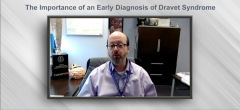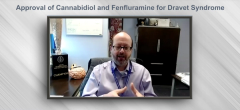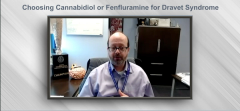
Approval of Cannabidiol and Fenfluramine for Dravet
M. Scott Perry, MD, discusses the exciting approval of cannabidiol and fenfluramine for Dravet syndrome.
M. Scott Perry, MD: The last couple of years have been really exciting because we’ve actually seen a lot of medications approved specifically for an indication of Dravet syndrome. As I said earlier, stiripentol was approved about 2 years ago based on the data out of Europe. Most recently, 2 new medications have been approved, the first being Epidiolex which is cannabidiol [CBD], as well as fenfluramine or Fintepla. Cannabidiol is a medication whose mechanism of action from an epilepsy standpoint is actually not known.
We know there are 2 receptors—CB1, CB2—that are cannabidiol receptors in the brain, but the CBD itself does not interact on those receptors, so that does not appear to be the mechanism of action. The drug has been approved for the treatment of 3 conditions: Lennox-Gastaut syndrome, Dravet syndrome, and now tuberous sclerosis complex, most recently, treating children ages 1 and up and the seizures associated with those syndromes.
In the Dravet population specifically, in those phase 3 trials, the average reduction overall of seizures was in the 42%, 45% range in people who took the cannabidiol versus those who took placebo. The placebo rates in those studies was in the mid-20% range, so 22% to 25%, so a higher placebo rate than we do see in some other studies. But nonetheless, significantly, it was an effective drug at a dose of 10 mg/kg per day. Now, there’s a second study where they compared a higher dose, 20 mg/kg per day to 10 mg/kg per day, and both studies showed similar seizure reduction overall, as I said, about 45%, 49%.
There was not a significant improvement in taking the higher dose versus the lower dose, but there was a difference with regard to [adverse] effects. More people had [adverse] effects the higher the dose you went. What kind of [adverse] effects might you get from taking this drug? You see some of the common things we see with other antiseizure medicine, so sleepiness, fatigue, diarrhea is more common. As far as the sleepiness goes, a lot of those patients were also on clobazam, and what’s important is that clobazam, the active metabolite of clobazam, which is desmethylclobazam, elevates as much as 5 times its baseline value in the setting of CBD.
For that reason, if you have sleepiness with this drug and the patient’s on clobazam, one way to maybe tolerate it better is to reduce the clobazam. That may fix the problem. Another adverse effect that people should be aware of is that there is a risk of elevated liver transaminases when taking CBD, Epidiolex. This tends to occur most often in the setting of also using valproic acid. Again, a lot of these patients are on those drugs, so you just need to be aware of it.
You need to monitor liver function testing when treating. The rate in the studies was anywhere from 7% to 15%. And again, it was much higher in people who took both CBD and valproic acid, so you certainly need to be aware of that. In my experience, the medication, it’s great to have it as another option for these patients. It’s great to have a medication that has had a phase 3 trial to tell you how it works and what to expect. It’s nice to know how it works as far as its interaction with other medications that we commonly encounter.
I think overall the drug is really well tolerated in the population despite the [adverse] effects I’ve listed. It’s actually really well tolerated, and it can be a very effective medication for many kids with Dravet syndrome, so it’s definitely worthwhile to have along. Now, a second drug that came out more recently is fenfluramine, which is branded as Fintepla in the United States. That’s another drug whose mechanism of action honestly is not really known from an epilepsy standpoint. We know that it works on the 5-HT2B [5-hydroxytryptamine receptor 2B] receptor, which is a serotonin mechanism, but that serotonin mechanism does not appear to be where it exerts its antiseizure properties.
That drug was approved after phase 3 trials in using fenfluramine in 3 groups. We had fenfluramine at 0.7 mg/kg, fenfluramine at 0.2 mg/kg, and then a placebo group in the phase 3 trials. What they saw in that is that patients with Dravet syndrome had an almost 67% to 70% reduction in overall convulsive seizures during the treatment phase compared to the placebo group. That’s comparing the high dose to the placebo group.
The lower dose group also had a significant reduction of seizures, about 30%, so both doses seem to be effective. They looked at a couple of other end points in that particular trial. They looked at 50% and 75% responder rates. Over 50% of the patients had a 50% responder rate, and actually, about 35%, 40% had a 75% reduction in seizures when taking the high dose group. So again, another very effective drug; 25% of the patients in the study either had zero or 1 seizure during the 14 weeks of the trial also, which again, when you think about Dravet syndrome where seizures are quite frequent, that was an impressive outcome overall.
The drug is well tolerated. It was a drug that in the past had been used as an appetite suppressant for weight loss, and so not surprisingly, one of the adverse effects we saw was decreased appetite when comparing it to placebo. Fortunately, while decreased appetite was present, significant weight loss was generally not present. Some did have it, but in general it was not a huge problem, but something to keep an eye on when treating patients with this drug.
The other thing to be aware of is that in the past, again fenfluramine has been used for other indications, there has been cardiac valvulopathy as well as pulmonary arterial hypertension. As a result, there is a REMS [Risk Evaluation and Mitigation Strategy] program and a requirement to get echocardiograms before using this drug, every 6 months while the patient is on the drug, and then, if they discontinue it, getting that testing done 3 to 6 months after they come off the drug.
The fortunate thing to know is that with over 3 years now worth of data from the fenfluramine program, and well over a few thousand echocardiograms and a few hundred patients, there have been no episodes of cardiac valvulopathy or pulmonary arterial hypertension. While we are still monitoring it, because now this is a real-world scenario, not under a protocol from a phase 3 trial, we have fortunately not seen that as an adverse effect to be concerned about so far.
Newsletter
Keep your finger on the pulse of neurology—subscribe to NeurologyLive for expert interviews, new data, and breakthrough treatment updates.
















